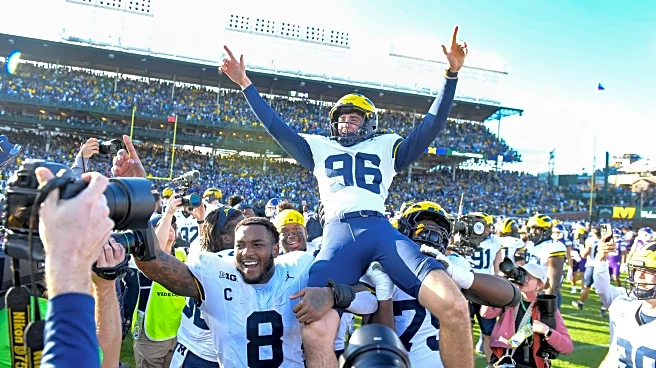What's Happening?
Jane Hedengren, a freshman at Brigham Young University (BYU), is on the verge of becoming the first female freshman in 40 years to win the NCAA Cross Country Championships. Hedengren, who has overcome a mysterious medical condition, is set to compete in the women's 6,000 meters race at Missouri's Gans Creek Course. Her coach, Diljeet Taylor, expressed confidence in her readiness and excitement for the event. Hedengren has already set a national high school record for 5,000 meters and has shown remarkable performance in various races, including defeating NCAA titleholder Pamela Kosgei in a recent meet. Her achievements have been supported by the resources and team environment at BYU, which have helped her develop her skills and confidence.
Why It's Important?
Hedengren's
potential victory would mark a significant milestone in NCAA history, highlighting the capabilities of young athletes in collegiate sports. Her success could inspire other young athletes and bring attention to the importance of nurturing talent within the U.S. collegiate system. Additionally, her story underscores the role of supportive coaching and team dynamics in achieving athletic excellence. The event also brings to light discussions around recruiting practices in NCAA sports, particularly the inclusion of foreign athletes, which has been a point of contention among coaches.
What's Next?
The NCAA Cross Country Championships will be televised live, providing a platform for Hedengren to showcase her talent on a national stage. Her performance could influence future recruitment strategies and discussions around the development of homegrown talent versus international athletes. The outcome of the race may also impact the rankings and strategies of competing teams, including BYU and Oklahoma State, which have differing views on recruitment practices.
Beyond the Headlines
The debate over recruiting foreign athletes in NCAA sports raises broader questions about diversity and inclusion in collegiate athletics. It challenges the balance between developing domestic talent and leveraging international expertise. This discussion may lead to policy reviews and changes in recruitment practices, affecting the composition of teams and the competitive landscape in NCAA sports.
















